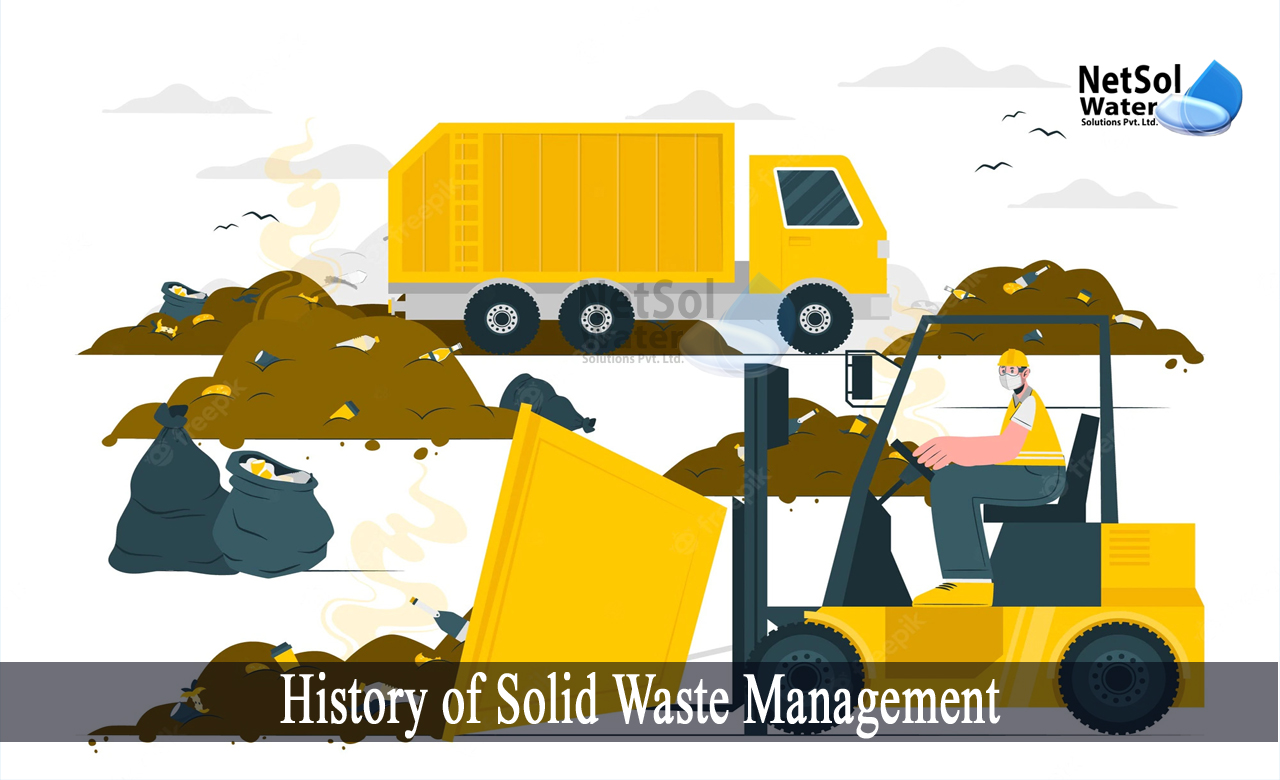What is the history of Solid Waste Management?
Solid-waste management is the collection, handling, and disposal of solid waste that is thrown away, after serving its purpose or becoming unusable.
Unsanitary circumstances brought on by improper municipal solid waste disposal can result in environmental contamination, and epidemics of vector-borne diseases, which are illnesses spread by rodents and insects. The handling of solid waste involves intricate technical issues. They also present a wide range of management and solution challenges, in the areas of administration, economy, and society.
Let us go over the history of solid waste management.
Historical background of Solid Waste Management (SWM)
Early dumping of waste
Wastes were thrown into unpaved streets and roadways in ancient cities, where they were allowed to build-up.
The first recorded rule outlawing this practice did not take effect until 320 BCE in Athens. At that time, Greece and the eastern Mediterranean cities with a Greek majority, started to develop a system for disposing of waste. Property owners were tasked, with keeping the streets in front of their properties, clean in ancient Rome.
Use of open pits for solid waste disposal
However, organized waste collection was only connected to government-sponsored events, like parades. Open pits beyond the city walls served as extremely basic disposal techniques. Transporting waste farther from the cities was attempted as populations grew.
Waste management and civic sanitation suffered a downturn, after the fall of Rome that persisted into the middle ages. Scavengers were assigned the duty of transporting waste to landfills, outside the limits near the end of the 14th century. But in smaller towns, where the majority of residents continued to throw waste into the streets, this was not the case.
It wasn't until 1714 that every English city had to have a designated scavenger. Boston, New York city, and Philadelphia started municipal waste collection, at the end of the 18th century in America. The techniques for getting rid of waste were still relatively primitive. For instance, waste gathered in Philadelphia was merely tossed into the Delaware River, downstream of the city.
Modifications to waste management
In the second half of the 19th century, a technological approach to solid-waste management started to take shape. In the United States, the first watertight waste cans appeared, and heavier vehicles were used to collect and transport waste.
Use of Incinerators for burning SW
The first waste incinerator was built in England in 1874, which was a major advancement in solid-waste treatment and disposal methods. 15% of the main American cities around the turn of the 20th century were burning solid waste. But even then, the majority of the biggest cities continued to employ archaic disposal practices, like open dumping on land or in water.
Creation of waste grinders, and pneumatic collection systems
During the first half of the 20th century, technological developments persisted, leading to the creation of waste grinders, compaction trucks, and pneumatic collection systems. But by the middle of the 20th century, it was clear that problems with pollution and threats to public health were being caused, by open dumping and incorrect combustion of solid waste.
Creation of sanitary landfills
In order to replace open dumping, and lessen the reliance on waste incineration, sanitary landfills were created.
Hazardous and non-hazardous waste was split into two categories in several nations, and distinct procedures were created for their disposal. Risks to the environment and public health were reduced, through landfill design and operation.
In order to meet strict air quality standards, new waste incinerators were built with significant air pollution control equipment, and were designed to recover heat energy from the waste.
Conclusion
Most developing and developed countries' modern solid-waste management facilities, now place more of an emphasis on recycling and waste reduction at the source, than on incineration and land disposal.
How can we assist?
The system designers at Netsol Water will be able to assess, all input and output needs for the client's project, and select the most efficient, practical, modern and sustainable solid waste management technique, for municipalities, residential areas, commercial areas, as well as industries. We can also ensure sustainable methods of solid waste disposal, along with recycle and reuse.
Netsol Water is Greater Noida-based leading water & wastewater treatment plant manufacturer. We are industry's most demanding company based on client review and work quality. We are known as best commercial RO plant manufacturers, industrial RO plant manufacturer, sewage treatment plant manufacturer, Water Softener Plant Manufacturers and effluent treatment plant manufacturers. Apart from this 24x7 customer support is our USP. Call on +91-9650608473, or write us at enquiry@netsolwater.com for any support, inquiry or product-purchase related query.



